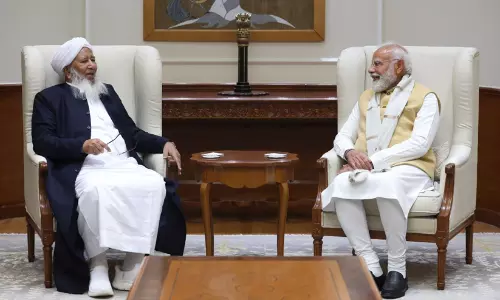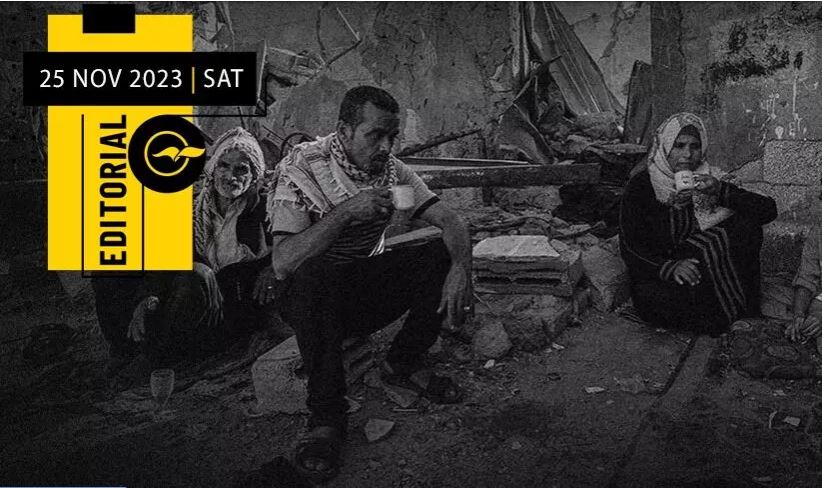
How long will the ceasefire last?
text_fieldsIsrael has declared a four-day ceasefire in the ongoing war with the Palestinian resistance movement Hamas in Gaza. Israel launched the war declaring its intent to ethnically cleanse Gaza, after Hamas attacked its borders on October 7. The ceasefire aims to create a window for the process of returning Israeli citizens taken hostage by Hamas. According to the agreement, Israel will release 150 people from its jails in exchange for the release of 50 Israeli members, including women and children, held by Hamas. The hostage release will occur over four days, with 10 people released each day starting on Friday. Israel will also permit the passage of 300 vehicles through its territory for the distribution of relief in Gaza, along with a significant increase in fuel supply. Israel will release hostages in proportion to the release of Palestinians held in Israeli custody. However, incidents have also been reported of Israeli soldiers shooting at Palestinians in southern Gaza, even after the ceasefire came into effect.
The world is eagerly awaiting the end of a war that has claimed over 15,000 lives. It must stop, even if only for a short time, to allow humanitarian and relief operations from foreign countries and international agencies to continue. The war has also sparked growing calls for a ceasefire in the capitals of the United States and European countries that support the conflict. Leaders in those countries are finding it increasingly difficult to ignore the rising tide of anti-war sentiment, even within their own ruling parties. The growing support for Palestine among young people in the United States is causing headaches for the Biden administration. The toughening of support towards Palestine by Arab-Muslim countries has also tilted the Israel-American-European racist alliance. Egypt and Jordan have come out against the war, realizing that the Netanyahu's plan to oust the Gazan people and establish a broader Israel would be a burden and liability for them. On the other hand, the war has led to the expansion of the conflict to more areas, as old armed groups in Yemen and Iraq, as well as Lebanese Hezbollah, have openly entered the fray to prop up the weakened resistance of Hamas.
As political pressure against Israel mounted externally, the demand for a ceasefire gained momentum within the Zionist nation, which stands at the peak of war crimes. Netanyahu, already weakened by political accusations, had embarked on a war to escape the stigma of Hamas's attack on October 7. However, even as all the lies touted to justify the killing of tens of thousands, including over 5,000 children lied, and excuses for the transformation of a small oppressed nation into a battlefield were exposed, Israel’s inflated image of world power continued to be hit, Netanyahu also came under trial. Several factors played a role in the consolidation of criticisms within Israel. They include: the revelation that the intensity of the October 7 attack was increased by the frenzy of the Israel army itself, the fact that the attack to exterminate Hamas turned into a demonic war against the people of Gaza, the loss of lives at every stage of the much-made-of land war, the warning that the safety of Israeli prisoners could not be guaranteed as the attack spread to every inch of Gaza, and the failure to capture any Hamas soldiers from the Al Shifa hospital, which was portrayed as a Hamas base. The depth of public anger within Israel can be gauged from the speed with which the Israel cabinet approved the ceasefire.
The fact that the release of hostages led to a ceasefire speaks for the tactical failure of Israel. Even earlier, Israel had been caught on the back foot in negotiation of hostage release. And the chronology of the events now make it clear that it was the negotiations initiated by Qatar and Egypt, mainly based on the release of hostages, that led to the current four-day ceasefire. And with the release of two aged Israelis and two Americans after a few days via talks mediated by Qatar and Egypt led to further steps towards a ceasefire with an exchange of hostages. But even now there is no certainty whether the term of ceasefire can be extended or not. Netanyahu has declared it as a temporary measure aimed at hostage exchange, and that attacks will resume after that. It's unclear, with the circumstances of the current ceasefire remaining as it is, whether the Western alliance will continue supporting Netanyahu's bellicosity, or if Israel will back the prime minister. If attacks resume, and if the belligerence continues, the question is whether the conflict has the potential to escalate and extend beyond Palestine into larger West Asia. And whether such an escalation could significantly affect political and power dynamics in the region and have repercussions on the power equations of the world, is a question that causes confusion and anxiety in equal measure among those who wish for a lasting ceasefire.























